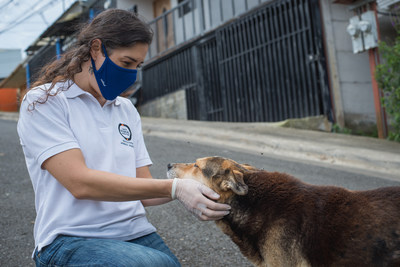More action needed to end rabies by 2030 deadline says World Animal Protection
TORONTO, Sept. 28, 2020 /CNW/ - Global charity World Animal Protection says more needs to be done to stop the spread of rabies worldwide. It is estimated that every year, rabies causes 59,000 deaths and an economic cost of about 8.6 billion U.S. dollars.

World Rabies Day (September 28th) is a strong reminder that the goal of eliminating rabies by 2030 may not be met. In 2015, at the Rabies Global Conference in Geneva, the world called for action, setting a goal of zero dog-mediated human rabies deaths by 2030 worldwide. That deadline is rapidly approaching and there's still a lot of work ahead, mainly due to a lack of resources required for rabies elimination and coordination at a global, regional and national level.
However, by countries implementing a humane dog population management (DPM) system, the 2030 goal can still be reached says World Animal Protection.
The charity works to end the inhumane culling of millions of dogs around the globe and introduced humane DPM as an essential element of successful rabies elimination. The approach demonstrates that killing dogs and vaccinating humans will not stop rabies. Mass dog vaccination, along with responsible ownership, will. Effective DPM also includes the introduction of educational campaigns with community engagement, as a way to facilitate mass dog vaccination.
It's estimated about 900 million dogs exist in the world and the majority of these dogs are strays. Many communities around the world see large groups of dogs as a nuisance and are worried they may be carrying rabies. In a misguided attempt to stop the spread, they end up killing innocent dogs, who are poisoned, electrocuted or simply beaten to death. Approximately 10 million dogs are inhumanely killed out of fear they have rabies every year. Yet, there's no evidence that killings of dogs reduce numbers in the long term.
Communities around the world can also struggle with a lack of vets to provide vaccines and spay and neuter dog programs to manage the populations. World Animal Protection works in places such as India, China and Thailand with governments to develop and create national rabies eradication strategies that include humane DPM. Since 2013, World Animal Protection's Better Lives for Dogs Campaign has vaccinated 1.6 million dogs against rabies worldwide.
During COVID-19 this has been more challenging, but the charity is still managing to continue its work when possible, offering vaccinations, as well as feeding programs for dogs, including in Sierra Leone, India, Thailand, Costa Rica and Brazil.
Nina Devries with World Animal Protection Canada says, "Vaccinations have the power to transform life for dogs and for people. We must continue working with our vets around the world and other key partners to tackle this disease once and for all. Without swift treatment, this disease is deadly, yet it is preventable with the right approach. Culling dogs will not eradicate rabies, but vaccinations for dogs will."
World Animal Protection has also launched a new report All Eyes on Dogs which provides actions needed to eliminate rabies in dogs by 2030. The report demonstrates how humane rabies control can contribute to the Sustainable Development Goals. And it highlights the importance of focusing on dogs and strategies that Mexico has used to eliminate rabies, such as stabilizing dog populations through reproductive control and offering mass, free canine rabies vaccinations. In 2019, 18 million canine vaccines were administered and the country will continue to vaccinate in the future.
Here in Canada, canine rabies has been mostly eliminated, however, vets still face challenges. Rabies does occur, mainly in bats, skunks and foxes, but dogs can be affected too. And in Canada's northern remote communities, dog population management is a more pressing issue.
World Animal Protection encourages dog owners and others to treat animals with respect and love worldwide and urges pet owners to keep vaccinations up to date. By working together, we can continue to keep our dogs happy and healthy. After all, life is always better with dogs.
About World Animal Protection
From our offices around the world, including China, Australia, Brazil, Kenya and Canada, we move the world to protect animals. Last year, we gave more than 3 billion animals better lives through our campaigns that focus on animals in the wild, animals in disasters, animals in communities and animals in farming. For more information visit www.worldanimalprotection.ca.
SOURCE World Animal Protection
